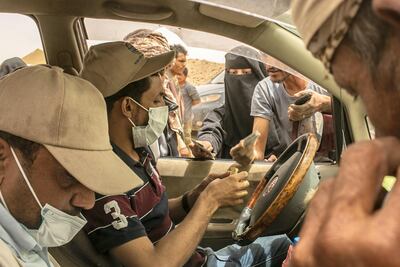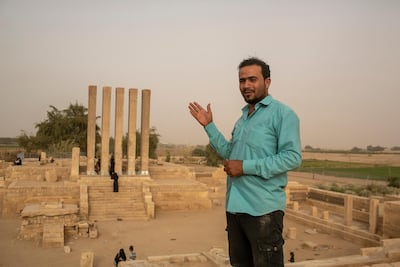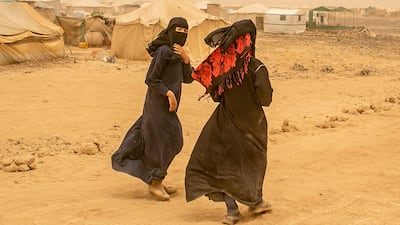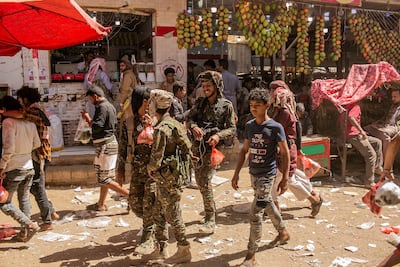In the past six years there has been an influx of two million Yemenis to Marib and its surrounding towns as people flee fighting or persecution by the Iran-backed Houthi rebels.
Once an almost forgotten outpost ruled by tribes, the city is now considered a safe haven. The Yemeni government's Executive Unit for Managing Displacement Camps estimates that 65 per cent of the country's internally displaced people now live in the province, either in tented camps or rented accommodation.
Fawwaz, a hotel employee from Ebb province, which has been controlled by the Houthis since October 2014, came to Marib to work for an oil pipeline company in 2008. He said the area has undergone a stunning transformation since then.
"The city [of Marib] was a village then, compared to nowadays," he told The National.

“There were no public services, no electricity, no roads, no parks, and there were only a couple of hotels, one hospital and one main road to connect to the capital. All these changes started in 2015.”
That year, Houthi rebels backed by Iran drove the internationally recognised government from the capital Sanaa, leading to a Saudi-led military coalition intervening.
The war has created what the UN has called the world’s worst humanitarian crisis, driving more than five million Yemenis from their homes.
The UN estimates that 100,000 have been killed, although local reports suggest the death toll could be double that.
Marib remains under government control. Coalition funding helped to build large camps for the displaced and the city became a centre of military operations.
Fawwaz said that when he lost his job at the start of the conflict he returned to Ebb, but struggled to find work. Many jobs only began paying salaries after six months of labour.
Instead he moved his family back to Marib.
“Many people want to leave Ebb like me and come here, but they either can’t leave their family or don’t have proper ID cards,” Fawwaz said.
Proof of identification is required for Yemenis to leave and travel around Houthi-held areas.
Many people in the country do not possess forms of ID, he said.
Fawwaz and his family are not the only ones to seek a safer and more prosperous life in Marib. His family live in an apartment, but thousands of others fill the 136 tented camps on the outskirts of the city.
Al Sawida camp, about 15 kilometres from the centre of Marib, was built in early 2020. It houses more than 1,800 families, 560 arrived recently because of increased fighting in the area.
Despite sandstorms and a renewed Houthi offensive on the area, camp residents say they are in Marib to stay.
Former government soldier Al Ezzy Al Reemy joined the Saudi-backed pro-government forces to fight against the Houthis in Marib while his family was still in Sanaa.
When he left to visit the capital, he was arrested by the rebels and spent two years in prison, before being released in 2018 as part of a prisoner exchange.
He then took his family and came to Marib.
“Freedom is priceless,” said his 14-year-old daughter, Hayat.
Many women in the camps say they prefer “the hell of the tents rather than the Houthis’ paradise".
Others say they have no choice but to remain in the last government stronghold in the war-torn country’s north.
"If you stay in Marib, you're most probably getting into trouble when you go back to the Houthis," said Rashad, 23, from Dhamar.
He left his home in northern Yemen six years ago after the area was seized by the Houthis.
"I wanted to finish my studies but the Houthi militias were recruiting many young people by force," he said.
"I escaped but now I can’t go back after living in Marib. It's the main city for the pro-government forces."
He drives buses to pay for his rent and his fees at Marib University, where he studies business administration.
“I’ve never thought I could live in Marib. During the former regime, Marib was a popular place for outlaws; it was a no-man’s land and there were no services,” Rashad said.

“We believe Ali Abdullah Salih left it deserted like this especially after oil was discovered in order to keep people away from its wealth.”
The rapid change in the city has led to a shift in the culture, Wafi, a former teacher from Hajja said.
“Here everyone is equal, no matter your region of origin, or where are you from in Yemen, because in contrast to many cities in Yemen, in Marib there is law,” he said.
He was jailed by the Houthis for almost three years because he was critical of the rebels' restrictions on expression.
He now lives in two tents with his family of 15 at Al Jufaina camp. It is the biggest displacement camp in Marib and is home to 75,000 internally displaced people.
Residents say basic services in Marib are better than in other cities. But above all, they say Marib gives people some security to work and invest.
Marib has a key oil refinery that produces 90 per cent of the country’s liquefied petroleum.
"It's still a good place and a stable place to invest," Fawwaz said.
“The local tribesmen work to make the place safe and they were very hospitable towards those displaced by the war."
The tribes in Marib and northern Yemen play a decisive role in the conflict. When it began, they sided with the government.
After a long stalemate, the Houthis resumed their assault on Marib in February.
The rebels have hit the city and its outskirts with shells and missiles.
“The Houthis will still have trouble taking Marib. It is not only the coalition that won’t let them, we will all fight for the city if necessary,” Rashad said.













